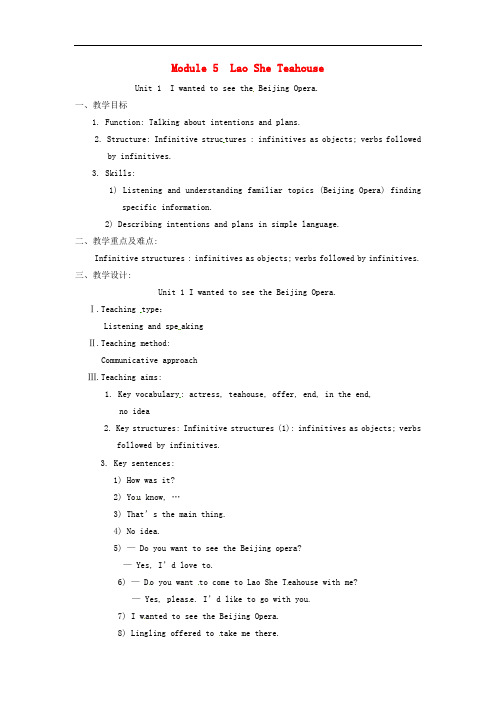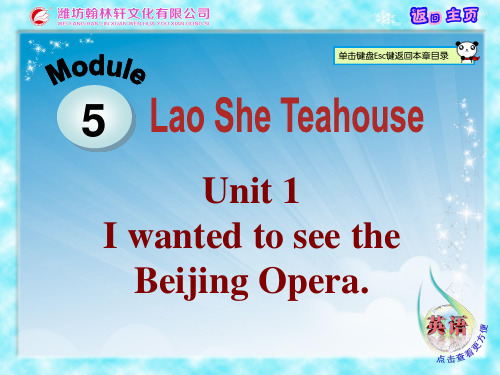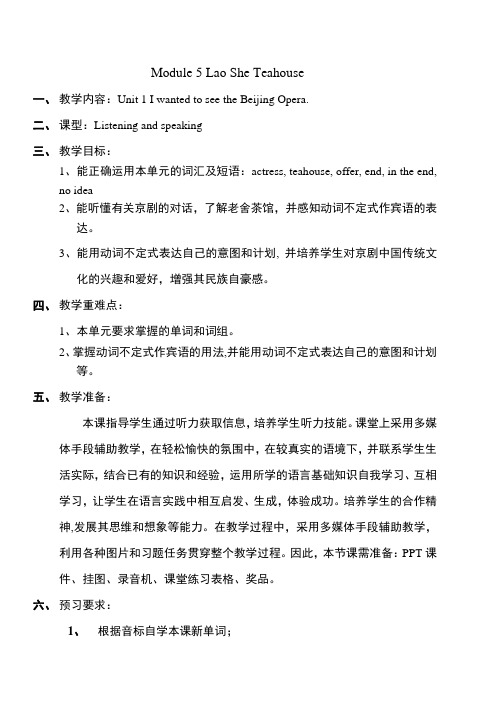八年级英语上册 Unit 1 I wanted to see the Beijing Opera导学案 新版外研版
八上M5U1I wanted to see the Beijing Opera

八年级上Module 5 Lao She TeahouseUnit 1 I wanted to see the Beijing Opera .导学案学习目标:1.正确使用以下单词、短语:actress, teahouse, offer, end,offer to,in the end,plan to do,hope to do2.能够听懂含有动词不定式的对话,感知和运用动词不定式作宾语的用法3. 体会我国传统文化的博大精深,激发我们对伟大的剧作家的兴趣,增强文化底蕴.课前预习1.预习Module 5 单词,做到会读,会写。
2.了解中国京剧文化及老舍茶馆。
课上探究Step 1.Warm up1.Enjoy something about Beijing Opera.学唱京剧:蓝脸的窦尔敦盗御马/红脸的关公战长沙黄脸的典韦/白脸的曹操/黑脸的张飞叫喳喳……2.Talk about Lao She and Teahouse.Step 2.Listening and reading1.Listen and underline the correct words or expressions in Activity2.2.Listen to the passage and underline the sentences with ―to do‖3.Make sentences with ―to do‖4.Read and check the true sentences.(Activity3)5.Read the passage after the reading-pen and find out the difficulties.6.Read again and underline the important phrases and sentences.Then discuss in groups.Step nguage points.1. ... so Lingling offered to take me there.……因此,玲玲提出带我去(那)。
八年级英语上册 Module 5 Unit 1 I wanted to see the Beijing Opera教案 (新版)外研版

Module 5 Lao She TeahouseUnit 1 I wanted to see the Beijing Opera.一、教学目标1. Function: Talking about intentions and plans.2. Structure: Infinitive struc tures : infinitives as objects; verbs followedby infinitives.3. Skills:1) Listening and understanding familiar topics (Beijing Opera) findingspecific information.2) Describing intentions and plans in simple language.二、教学重点及难点:Infinitive structures : infinitives as objects; verbs followed by infinitives.三、教学设计:Unit 1 I wanted to see the Beijing Opera.Ⅰ.Teaching type:Listening and spe akingⅡ.Teaching method:Communicative approachⅢ.Teaching aims:1. Key vocabulary: actress, teahouse, offer, end, in the end,no idea2. Key structures: Infinitive structures (1): infinitives as objects; verbsfollowed by infinitives.3. Key sentences:1) How was it?2) Yo u know, …3) That’s the main thing.4) No idea.5) — Do you want to see the Beijing opera?— Yes, I’d love to.6) — D o you want to come to Lao She T eahouse with me?— Yes, pleas e. I’d like to go with you.7) I w anted to see the Beijing Opera.8) Lingling offered to take me there.Ⅳ. Teaching aids:Tape recorder, PPTⅤ.Teaching StepsStep 1. Warming-up1). Show some pictures.2). Look at the pictures, and say something about the pictures.3). Introduce the new words.4). Talk about Lao She Teahouse and Lao She.Step 2. Work in pairs.Ask and answer about what you can do at Lao She Teahouse in pairs.Step 3. Listening practice.1. Ask the students to listen to the tape and then fill in the blanks. (L:Lingling B: Betty)L: Hi, Betty.B: Hi, Lingling. I’d _____ to see the traditional Beijing Opera.L: Do you want to come to Lao She ______ with me?B: What’s Lao She Teahouse?L: You can ______ ______ the Beijing Opera there and _____ ______at the same time.B: Yes, please. I’d like to go with you. You can tell me what’s happening. L: Yes, it’s quite __________ to understand the story. Just watch the actors and actresses, listen to the music and try to _______ it.2. Check the answers:Step 4. Listening practice.1.Listen and finish the ex ercises.1). Why did Lingling take Betty to the teahouse?Because she ______ ______ see the Beijing Opera.2). What did Betty and Lingling do at the teahouse?They drank ______ and ______ an opera .3). How long did Lingling and Betty plan to watch the traditional BeijingOpera?A. For an hourB. for two hoursC. For three hours2. Check the answers:Step 5. Reading time:1. Read the conversation and choose the correct answers.1). Betty and ____ went to Lao She Teahouse last night.A. TonyB. LinglingC. Be tty2). Betty ho pe to _______ ne xt time.A. understand moreB. understanding moreC. understand less3). — How long did they stay in the end? — They stayed for ___. A. 3 hours B. 2 hours C. 1 hour4). Lao She is a(n) ________A. great actorB. great waiterC. great writer2. Read the conversation again and find out infinitives.3. Ask the students to read the conversation again and then complete thepassage.Betty’s BlogThe visit to the Lao She TeahouseLingling and I went to Lao She Teahouse last night. I wanted ________ the Beijing opera, so Lingling __________________ me there,we drank tea and _______ an opera . I t is hard for me __________________ , but the actors and actresses are ____________. At first, we planned _____________ for an hour, but in the end, we stayed ____________________. The main thing is that it was ______________, I hope_________________________ next time. Because the tea house is very famous, I asked Lingling ___________ me there. Lingling told me that Lao She is a famous ________, and he ___________________ his play Teahouse. We really had ______________________.4. Check the answers.5. Read the passage by themselves.Step 6.Summary:Step 7 H omework:Writing:假如你昨天参加了你的朋友Bill的生日聚会,而且是你的另一个朋友Jerry主动提出带你去的,设定一个过生日的情景,自编一段对话,尽可能多的用动词不定式。
八上外研社英语Unit 1 I wanted to see the Beijing Opera

Talk about these questions:
1. Who is Lao She? 2. What do you know about Lao She? 3. What works of Lao She have you read? 4. Have you ever heard about his play Teahouse? 5. What do you think people can do in Lao She Teahouse?
一、用所给词的适当形式填空。
1. She asked me ______ to wait (wait) for her at the cinema. listening (listen) to the radio in the evening. 2. I enjoy ________
3. It is not easy _______ to learn (learn) a foreign language.
famous ___ for writing Teahouse. Lao Shebecame _______ _______
3. It is possible for us to finish the work in three hours. (改为否定句) is __________ impossible for us to finish the work in three It __
5
Unit 1 I wanted to see the at the pictures about Beijing Opera and Lao She
Teahouse.
Lao She Teahouse
Beijing Opera
八年级英语 上册Lao She Teahouse Unit 1 I wanted to see the Beijing Opera教案 新外研版

Module 5 Lao She TeahouseUnit 1 I wanted to see the Beijing Opera.ⅠTeaching modelListening and speakingⅡTeaching methodPWP approachⅢ Teaching aims1. Key vocabulary: actress, teahouse, offer, end, in the end, no idea2. Key structures: Infinitive structures (1): infinitives as objects; verbs followed by infinitives.3. Key sentences:1) How was it?2) You know, …3) That’s the main thing.4) No idea.5) — Do you want to see the Beijing opera?—Yes, I’d love to.6) — Do you want to come to Lao She Teahouse with me?—Yes, please. I’d like to go with you.7) I wanted to see the Beijing Opera.8) Lingling offered to take me there.Ⅳ Teaching aidsTape recorder, OHP, videoⅤTeaching StepsStep 1 Warming-up1. Enjoy a play: Lao She Teahouse2. Show some pictures.3. Look at the pictures, and talk something about the pictures.4. Introduce the new words.5. Learn the new words.6. Read the new words.Step 2 Work in pairs.1. Ask the students to read the words in the box in Activity 1.actress dance music play sing teahouse theatre traditional2. Look at the pictures in Activity 1, and talk about them.3. Work in pairs. Use the words from the box to help you.Step 3 Listening practice.1. Ask the students to read through the sentences in Activity2.1) Betty often sees / wants to see some traditional Beijing opera.2) Betty knows / doesn’t know Lao She Teahouse.3) Lingling says that the opera is easy / difficult to understand.2. Play the recording once without stopping.3. Listen and underline the correct words.4. Play the recording again and ask the whole class to check with a partner.5. Check the answers:Keys: 1. wants 2. doesn’t know 3. difficultStep 4 Listen and read.1. Show some pictures, and ask the students to talk about them.2. Ask the students to read the conversation silently.3. Play the recording and ask the students to listen and read the conversation.4. Read the conversation.5. Act it out.6. Learn “Everyday English”1) How was it?2) You know, …3) That’s the main thing.4) No idea.Step 5 Check the true sentences.1. Ask the students to read the conversation again.2. Now check the true sentences.1) Tony went to Lao She Teahouse with Betty and Lingling.2) Betty understood the opera.3) Lingling and Betty stayed longer than they planned.4) Betty enjoyed the opera.5) Betty would like to go to the opera again.6) Betty knew about Lao She before she went to the teahouse.3. Ask the students to check with a partner.4. Check the answers:Keys: 1. × 2. × 3. √ 4. √ 5. √ 6. ×Step 6 Complete the passage.1. Ask the students to read the words in the box in Activity 4.actress difficult end main offer2. Read through the passage.Betty wanted to see the Beijing opera, so Lingling (1) ________ to take Betty to Lao She Teahouse. The words of the opera were (2) ________ to understand, but the actors and (3)__________ were excellent. They only planned to watch for an hour, but in the (4) ________, they stayed for three hours. Betty thought it was interesting — that was the (5) ________ thing!3. Complete the passage with the correct form of the words from the box.4. Ask the students to check with a partner.5. Check the answers:Keys: 1. offered 2. difficult 3. actresses 4. end 5. mainStep 7 Listen and repeat.1. Play the recording once without stopping.2. Play the recording again and ask the whole class to repeat.1) — Do you want to see the Beijing opera?—Yes, I’d love to.2) — Do you want to come to Lao She Teahouse with me?—Yes, please. I’d like to go with you.3. Ask the students to listen and mark the intonation.4. Now listen again and repeat.Step 8 Work in pairs.1. Ask the students to read the conversations in Activity 5 aloud.2. Make true sentences.1) I want to ___________ next week.2) They offered to ___________.3) I hope to ___________ one day.4) My parents agree to ____________ on Saturday.3. Talk about something you’d like to do or see.— I want to go to Xinjiang and ride horses.—…Step 9 Important and difficult points1. — Who is Lao She? 老舍是谁?— No idea. 不知道。
初中英语外研版八年级上册《M5 Unit 1 I wanted to see the Beijing

Module 5 Lao She Teahouse一、教学内容:Unit 1 I wanted to see the Beijing Opera.二、课型:Listening and speaking三、教学目标:1、能正确运用本单元的词汇及短语:actress, teahouse, offer, end, in the end,no idea2、能听懂有关京剧的对话,了解老舍茶馆,并感知动词不定式作宾语的表达。
3、能用动词不定式表达自己的意图和计划, 并培养学生对京剧中国传统文化的兴趣和爱好,增强其民族自豪感。
四、教学重难点:1、本单元要求掌握的单词和词组。
2、掌握动词不定式作宾语的用法,并能用动词不定式表达自己的意图和计划等。
五、教学准备:本课指导学生通过听力获取信息,培养学生听力技能。
课堂上采用多媒体手段辅助教学,在轻松愉快的氛围中,在较真实的语境下,并联系学生生活实际,结合已有的知识和经验,运用所学的语言基础知识自我学习、互相学习,让学生在语言实践中相互启发、生成,体验成功。
培养学生的合作精神,发展其思维和想象等能力。
在教学过程中,采用多媒体手段辅助教学,利用各种图片和习题任务贯穿整个教学过程。
因此,本节课需准备:PPT课件、挂图、录音机、课堂练习表格、奖品。
六、预习要求:1、根据音标自学本课新单词;2、查找相关资料,找出你认为本课较重要的语言点和短语。
七、教学过程:达标训练题一、单项选择()1. He stayed at home for ________ hour.A. aB. anC. theD. \()2.The old man was badly ill and we _____ him _____ hospital right away.A. take; toB. bring; toC. took; toD. brought ; to ()3. It is difficult for the boy _______ English well.A. learnB. learnsC. to learnD. learning()4. –Don’t forget _______ your homework.- OK. I’ll do it right now.A. doingB. doC. to doD. did()5. Would you please show me the way _________ the bank?A. inB. forC. withD. tot二、根据汉语完成句子,每空一词。
八年级英语上册M5LaoSheTeahouseUnit1Iwanted

一、根据句意及汉语提示填写单词。 1.Many Chinese like to see Lao She T_e_a_h_o_u__se__(茶馆).
2.Zhao Wei is a famous Chinese __a_c_tr_e_s_s_(女演员). 3.His father bought a bicycle for him at the __e_n_d(末尾;结束) of last year. 4.Tina ___o_ff_e_r_e_d___(提出) to help me with my English last week.
A.for,as
B.as,for
C.for,is
D.as,is
( B )13.They want to ________ the Beijing Opera. A.look at B.see C.watch D.look ( A )14.Chinese,math and English are our ________ subjects. A.main B.careless C.low D.quick
Being kind is more important than being right. 善良比真理更重要.
You should never say no to a gift from a child. 永远不要拒绝孩子送给你的礼物.
Sometimes all a person needs is a hand to hold and a heart to understand. 有时候,一个人想要的只是一只可握的手和一颗感知的心.
请您欣赏
最新精选初中八年级上英语Unit 1 I wanted to see the Beijing Opera.外研版拔高训练三十一

最新精选初中八年级上英语Unit 1 I wanted to see the Beijing Opera.外研版拔高训练三十一第1题【单选题】People are usually busy getting ready for the Spring Festival the year.A、in the endB、in the end ofC、at the end ofD、at the end【答案】:【解析】:第2题【单选题】The little boy _______ his seat to an old woman on the bus.A、offeredB、broughtC、lentD、took【答案】:【解析】:第3题【单选题】Will you please ask him ______my party tomorrow evening?A、to comeB、comeC、comingD、came【答案】:【解析】:第4题【单选题】As you are not feeling well, you"d better_______ to school.A、won"t goB、not goC、not to goD、don"t go【答案】:【解析】:第5题【单选题】Sanya is famous _______ its beautiful beaches.A、forB、ofC、inD、as【答案】:【解析】:第6题【填空题】She wants ______ (take) Bob to the zoo tomorrow morning.【答案】:【解析】:第7题【填空题】— Did you plan ______ (go) to the cinema with Mary?— Yes, I did.【答案】:【解析】:第8题【填空题】You"d better ______ (practise) ______ (speak) English in the morning. 【答案】:【解析】:第9题【填空题】Physics is an ______ (interest) subject. I am very ______ (interest) in it. 【答案】:【解析】:第10题【句型转换】Betty"s mum enjoyed the Beijing Opera(改为一般疑问句)______Betty"s mum______the Beijing Opera?【答案】:【解析】:第11题【翻译】每天开心——那是最重要的事情。
外研版八年级上册课件Unit 1 I wanted to see the Beijing Opera.

如: ①这条路到此结束。 The road __e_n_d_s_______ here. ②最后我们班赢得了这场足球赛。 _I_n_t_h_e_e_n_d____,our class won the football match.
拓展: at the end of +时间名词 “在……(时间)结束时, 在……末/底” at the end of +地点名词 “在……(地点)的终点, 末端, 尽头” by the end of… “到……结束时为止”(常与完成时连用)
课文理解
一、听对话。 听Unit 1 Act. 2 对话,回答第1~2小题。对话听两遍。
(C)1. What do people do at Lao She Teahouse? A. Listen to the Beijing Opera. B. Drink tea. C. Both A and B.
(B)8. When I’m in trouble, my sister always ____.
A. offers helping me
B. offers to help me
C. asks me to help
D. asks me for help
(D)9. People are busy getting ready for the Spring Festival
那儿。
there.
3. ……很难听懂唱词。
…it was difficult to
understand the words.
4. 我们本来计划只看一小时 We only planned to watch
……
for an hour…
5. 我希望下次能懂得更多。 I hope to understand more
- 1、下载文档前请自行甄别文档内容的完整性,平台不提供额外的编辑、内容补充、找答案等附加服务。
- 2、"仅部分预览"的文档,不可在线预览部分如存在完整性等问题,可反馈申请退款(可完整预览的文档不适用该条件!)。
- 3、如文档侵犯您的权益,请联系客服反馈,我们会尽快为您处理(人工客服工作时间:9:00-18:30)。
Module 5 Lao She TeahouseUnit 1 I wanted to see the Beijing Opera.第一课时一、学习目标:1. 初步掌握本课重点词汇和句型2. 理解课文内容,提高有关戏剧或话剧的听说技能3. 初步感知动词不定式的用法二、学习重点:理解课文内容,初步感知动词不定式作宾语的用法三、学习难点:初步理解动词不定式作宾语的用法课前预习一、使用说明与学法指导:1. 朗读并识记单词表中本课新词汇,不会读的用红笔标记2. 试读听力部分的单词及课文对话,初步理解对话,不会读或不能理解的用红笔标记二、教材助读:1. 查阅有关老舍及其作品的资料,并准备简短的英文描述2. 朗读并识记听力部分的单词并根据活动预测听力内容,为听力扫除障碍3. 仔细预习课本语法部分关于本模块的语法知识,朗读并理解课文对话,勾划出对话中出现的动词不定式三、预习自测翻译下列单词、短语及句子1. (女演员) ______________2. 茶馆______________3. 提议,提出______________4. 末尾;结束_________________5. 最后,终于__________________________6. 不知道_____________________7. 提议做某事_________________________8. plan to do sth. ________________ 9. 呆三小时_________________________10. 想做某事___________________ 11. 带某人去某地_____________________四、我的疑问:_____________________________________________________________________________ _____________________________________________________________________________课内探究一、情景导入:Talk: What do you know about Lao She?What about the story of Teahouse?二、洗耳运动完成听力部分三、逐步完成Listen and read及后面的练习四、质疑探究自读课文,并翻译、背诵下列重点句:1.---How was it?---It was great.2.Lingling of fered to take me there.3.It was difficult to understand the words.4.That’s the main thing.5.I hope to understand more next time.6.We only plan to watch for an hour.7.I wanted to see the Beijing Opera.[五、当堂检测Work in groups. Make dialogues talking about the opera Teahouse.六、课后反思__________________________________________________________________________________________________________________________________________________________课后训练根据首字母或中文意思写单词:1.Zhang Ziyi is a famous Chinese a_________________.o She’s T_____________________ is a well-known play in China.3.My father o_____________________ ( 主动提出 ) to take me to Beijing.4.I have no i________________ about the English test.5.In the e________________, we understood what he said.6.We want to see the Beijing O________________.课后学习指导:朗读对话并背诵,注意语音语调Un it 1 I wanted to see the Beijing Opera. 第二课时一、学习目标:1. 熟练掌握本课重点词汇句型,并初步理解动词不定式作宾语的用法2. 能听懂和理解有关戏剧或话剧的话题,培养听说技能3. 能用动词不定式进行简单的对话二、学习重点:初步理解动词不定式作宾语的用法三、学习难点:理解并熟悉搭配动词不定式的动词课前预习一、使用说明与学法指导:1. 通过语音训练拓展日常交际用语2. 通过对话表演方式大胆开口,能用英语进行有关戏剧或话剧的交流3、观察对话总结接动词不定式作宾语的单词或结构二、教材助读:朗读并理解语音部分的词句,注意结对反复练习句子重读三、预习自测(一) 小组合作练习Activity 5中的重读单词,相互纠正(二) 完成Activity 7并结对练习Activity 8部分,注意结合Activity5的知识反复练习四、我的疑问:_____________________________________________________________________________ _____________________________________________________________________________课内探究一、情景导入Work in pairs. Retell the main idea of the c onversation.二、按要求完成语音部分注意英语口语中的重读现象三、质疑探究知识要点探究1. The Beijing Opera is difficult to understand. 京剧很难懂。
此句可以转换为同义句:_________ _________ _________ understand the Beijing Opera. (be) difficult to understand意思是“难懂”,英语中常见“形容词 + 不定式”的用法,表示“做某事……”,常见的其它形容词构成的短语如:be pleased / happy / glad to do sth. 高兴做某事 be sorry to do sth. 抱歉做某事2. No idea. 不知道。
其完整表达是I have no idea.相当于___________________________3. 请摘抄对话中的6个搭配不定式的动词的句子并翻译成汉语:_______________________________________________________________________________ _______________________________________________________________________________ _______________________________________________________________________________ _______________________________________________________________________________ _______________________________________________________________________________ _______________________________________________________________________________ 总结:动词_________________________________________________后面可以接动词不定式。
思考:以上六个句子中不定式分别表示什么样的含义?四、当堂检测用所给词的适当形式填空:1.He wants _________________ (be) a doctor.2.It’s difficult _______________________ (understand) the words in this film.3.My mother offered ______________________ (buy) me a new bike.4.Li Mei plans _______________________ (have) a birthday party this Saturd ay.5.I hope ________________________ (visit) Nann ing this Sunday.6.My teacher asks me _______________________ (study) hard.五、课后反思_____________________________________________________________________________ _____________________________________________________________________________课后训练1. 借助资料查阅句子成分中的主语、谓语、宾语分别是什么2. 思考并组内讨论:当堂检测部分的六个句子中,________________的不定式做宾语,_____________的不定式做主语。
你的思路是怎样的?3. 继续小组探讨分析要点探究3所摘抄的六个句子中不定式分别在句中充当什么成分?。
